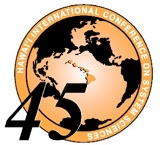Open Government, Transparency, & Citizen Engagement Minitrack

Co-chairs
John C. Bertot (Primary Contact)
College of Information Studies
University of Maryland
2118B Hornbake Building, South Wing
College Park, ML 20742, USA
Phone: +1-301-405-3267
Fax: +1-301-314-9145
Email: jbertot@umd.edu
Karine Nahon
The Information School
University of Washington
Mary Gates Hall, Room 330V, Box 352840
Seattle, WA 98195-2840, USA
Phone: +1-206-685-6668
Fax: +1-206-616-3152
Email: karineb@u.washington.edu
Scott Robertson
Department of Information and Computer Sciences
University of Hawaii at Manoa
Pacific Ocean Science and Technology Building
1280 East-West Road
Honolulu, HI 96822, USA
Phone: +1-808-956-2023
Fax: +1-808-956-3548
Email: scott.robertson@hawaii.edu

Go to HICSS Conference Site
This minitrack focuses on the interactions between the public and governments. More specifically, this minitrack focuses on open and transparent government, engagement, and the direct involvement of the public in the development, use, and evaluation of e-Government and Digital Democracy dynamics, initiatives, and systems. As e-Government becomes more ubiquitous, many questions arise about what it means to develop and maintain an open and transparent government, to engage in participatory democracy, notions of governance through transparency initiatives, co-design of open and collaborative government, how democratic/governmental institutions might be influenced through open government and transparency efforts, and research that develops and explores open and transparent government frameworks, theories, and practice.
Open government is an approach, which purposefully emphasizes and re-invigorates the basic principle of a “government of the people, for the people, and by the people.” Despite long-lived principles of open and transparent government, government agencies at all levels often operate in secrecy with regard to the business of government. Through information technology, committed administrative leadership, and policies, countries around the world have now entered an era of unprecedented transparency of government operations and decision making intended to lead to more responsibility, accountability, collaborative and participatory government, and integrity of public officials. These trends can create new and strengthen old gaps and challenges between intersections of security, privacy, freedom of information, efficiency, transparency, and governance. Understanding how to balance these challenges, or what are the boundaries of open government will become crucial in the coming years.
In this minitrack, we welcome theoretical papers as well as quantitative and qualitative studies on the topics. Good practices will also be accepted with strong implications for theory and practice.
Topics and research areas include, but are not limited to
-
-Theories, quantitative and qualitative studies on open government
-
-Open/transparent government initiatives around the world
-
-Freedom of information and transparency
-
-Participation and deliberation
-
-Studies of citizens and democratic processes in virtual worlds
-
-Gov 2.0 and beyond
-
-Impact on society, communities, companies and government
-
-e-citizen, e-democracy and e-participation
-
-Technologies enabling/inhibiting open/transparent government
-
-Good practices and pitfalls in open government, public engagement, collaboration
-
-Experience and involvement of the “e-Citizen”
-
-Technology-based approaches to making available government information
-
-Studies of the universal access requirements of e-Government
-
-Impact of policy on transparency and openness
-
-Privacy, security, and the right to know
-
-Collaborative design and participation
More co-chair information
John Carlo Bertot, PhD/Syracuse, is Professor at the University of Maryland's College of Information Studies. He also serves as Director of the Center for Library and Information Innovation. His research interests center on Information and telecommunications policy; e-government; planning and evaluating library services, with an emphasis on networked services; public library use of and involvement with the internet. He is also the editor-in-chief for Library Quarterly and Government Information Quarterly.
Karine Barzilai-Nahon, PhD, is an assistant professor at the Information School, former director of the Center for Information & Society, faculty adjunct at the department of Communication and affiliated faculty at the Center for Communication and Civic Engagement in University of Washington. Her research interests lie in information policy and politics and in the social aspects of the management of information. She has a PhD and MSc in Management of Information Systems (2004) and BA in Computer Science and Political Science. She serves as an expert in decision-making forums that relate to Internet and information technology policy; advises the science and technology committee of the Israeli parliament and she represents Israel in the UN in various committees.
Scott P. Robertson, PhD, is an Associate Professor in the Department of Information and Computer Sciences at the University of Hawaii at Manoa where he is also the founder and director of the Hawaii Computer-Human Interaction Lab. He teaches and conducts research in the area of Human-Computer Interaction, specifically Digital Government. Scott earned his PhD from Yale University (1983), an M.A. in Psychology/Cognitive Science from California State University, Fullerton (1979,), and a B.A. in Psychology from the University of California, Irvine (1976)

“How to Develop and Enact the Principles of Open Government, Transparency, and Citizen Engagement in Government of the 21st Century?”






